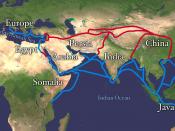Globalization broadly refers to the expansion of global linkages, the organization of social life on a global scale, and the growth of a global consciousness, hence to the consolidation of world society. Such an ecumenical definition captures much of what the term commonly means, but its meaning is disputed. It encompasses several large processes; definitions differ in what they emphasize. Globalization is historically complex; definitions vary in the particular driving force they identify. The meaning of the term is itself a topic in global discussion; it may refer to "real" processes, to ideas that justify them, or to a way of thinking about them. The term is not neutral; definitions express different assessments of global change. Among critics of capitalism and global inequality, globalization now has an especially pejorative ring.
At a top political and economic level, globalization is the process of denationalization of markets, politics and legal systems, i.e.,
the rise of the so-called global economy. The consequences of this political and economic restructuring on local economies, human welfare and environment are the subject of an open debate among international organizations, governmental institutions and the academic world. This portal does not take part in this debate or offer any information on this matter.
At a business level, we talk of globalization when companies decide to take part in the emerging global economy and establish themselves in foreign markets. First they will adapt their products or services to the final user's linguistic and cultural requirements. Then, they might take advantage of the Internet revolution and establish a virtual presence on the international marketplace with a multilingual corporate web site or even as an e-business.
In the context of this portal, globalization is the process of adapting software applications and web sites, so that they are linguistically and functionally suitable for...


